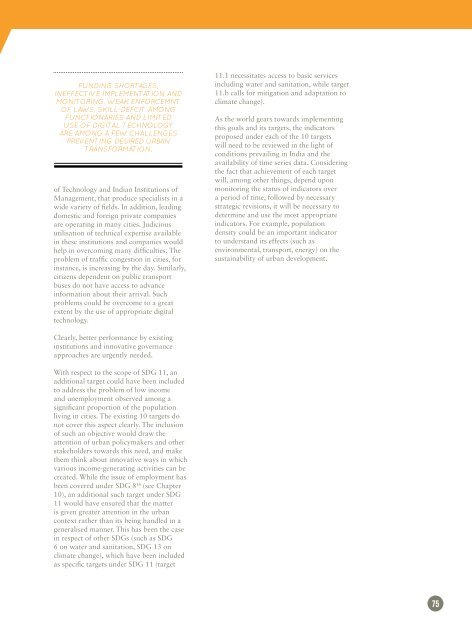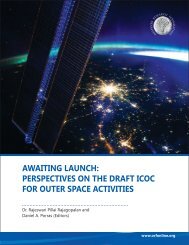Mathur Ritika Passi
zVAWsQ
zVAWsQ
Create successful ePaper yourself
Turn your PDF publications into a flip-book with our unique Google optimized e-Paper software.
FUNDING SHORTAGES,<br />
INEFFECTIVE IMPLEMENTATION AND<br />
MONITORING, WEAK ENFORCEMNT<br />
OF LAWS, SKILL-DEFCIT AMONG<br />
FUNCTIONARIES AND LIMITED<br />
USE OF DIGITAL TECHNOLOGY<br />
ARE AMONG A FEW CHALLENGES<br />
PREVENTING DESIRED URBAN<br />
TRANSFORMATION.<br />
of Technology and Indian Institutions of<br />
Management, that produce specialists in a<br />
wide variety of fields. In addition, leading<br />
domestic and foreign private companies<br />
are operating in many cities. Judicious<br />
utilisation of technical expertise available<br />
in these institutions and companies would<br />
help in overcoming many difficulties. The<br />
problem of traffic congestion in cities, for<br />
instance, is increasing by the day. Similarly,<br />
citizens dependent on public transport<br />
buses do not have access to advance<br />
information about their arrival. Such<br />
problems could be overcome to a great<br />
extent by the use of appropriate digital<br />
technology.<br />
11.1 necessitates access to basic services<br />
including water and sanitation, while target<br />
11.b calls for mitigation and adaptation to<br />
climate change).<br />
As the world gears towards implementing<br />
this goals and its targets, the indicators<br />
proposed under each of the 10 targets<br />
will need to be reviewed in the light of<br />
conditions prevailing in India and the<br />
availability of time series data. Considering<br />
the fact that achievement of each target<br />
will, among other things, depend upon<br />
monitoring the status of indicators over<br />
a period of time, followed by necessary<br />
strategic revisions, it will be necessary to<br />
determine and use the most appropriate<br />
indicators. For example, population<br />
density could be an important indicator<br />
to understand its effects (such as<br />
environmental, transport, energy) on the<br />
sustainability of urban development.<br />
Clearly, better performance by existing<br />
institutions and innovative governance<br />
approaches are urgently needed.<br />
With respect to the scope of SDG 11, an<br />
additional target could have been included<br />
to address the problem of low income<br />
and unemployment observed among a<br />
significant proportion of the population<br />
living in cities. The existing 10 targets do<br />
not cover this aspect clearly. The inclusion<br />
of such an objective would draw the<br />
attention of urban policymakers and other<br />
stakeholders towards this need, and make<br />
them think about innovative ways in which<br />
various income-generating activities can be<br />
created. While the issue of employment has<br />
been covered under SDG 8 14 (see Chapter<br />
10), an additional such target under SDG<br />
11 would have ensured that the matter<br />
is given greater attention in the urban<br />
context rather than its being handled in a<br />
generalised manner. This has been the case<br />
in respect of other SDGs (such as SDG<br />
6 on water and sanitation, SDG 13 on<br />
climate change), which have been included<br />
as specific targets under SDG 11 (target<br />
75








